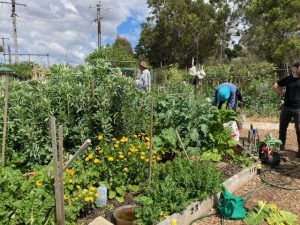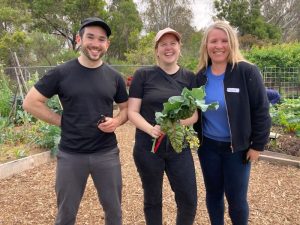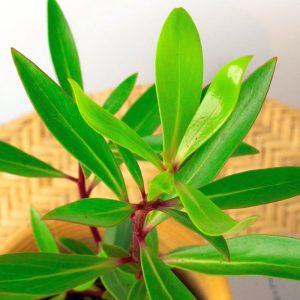Thanks to the people who have contributed to this week’s newsletter: Ann Stanley, Claire Smith, Hayden Marks, Jennie Ramage, Jules Jay, Lee Ann Balcam and Susan Palmer.
Ann Stanley visits Rushall Community Garden
[Ann, who is both a regular contributor to this newsletter and the host of The Melbourne ‘Local Food Connections’ community radio show, has decided that she is going to visit a number of the community gardens in North East Melbourne and write up the results for this newsletter. Would you like Ann to visit your community garden? If so, email us.]
[Ann’s first visit was to Rushall Community Garden in Fitzroy North. Read her full writeup on our website, a shortened version of which is given below.]
 Rushall Community Garden is well planned. The spring crop is lush and beautiful in irregular-shaped beds with close plantings of healthy silverbeet, fennel, asparagus and every other spring thing. There is a large water-tank, a tidy composting system, thriving worm farms, and a propagation area, all separated with neat paths. There are both individual allotments and space for communal gardening projects.
Rushall Community Garden is well planned. The spring crop is lush and beautiful in irregular-shaped beds with close plantings of healthy silverbeet, fennel, asparagus and every other spring thing. There is a large water-tank, a tidy composting system, thriving worm farms, and a propagation area, all separated with neat paths. There are both individual allotments and space for communal gardening projects.
Lyn, one of the gardeners, told me how it worked and this gave me a sense of how the garden is managed. Lyn put herself on the waiting list several years ago and spent the long wait volunteering in working bees and in the public areas just outside the fence until, eventually, she had the opportunity to share a plot with another member. That’s when her own food growing started. Seeing plants grow from seed into food has given her much joy ever since.
 There are communal plots as well as individual ones and Lyn explains that taking from these works on an honour system, which is the case also for taking fruit from the fruit trees. “People help themselves. Any surplus is put outside the fence for passers-by from the local community to take.”
There are communal plots as well as individual ones and Lyn explains that taking from these works on an honour system, which is the case also for taking fruit from the fruit trees. “People help themselves. Any surplus is put outside the fence for passers-by from the local community to take.”
She explains that the Committee oversees the buying in of products such as mushroom compost and manure, which are then made available for use. This ensures that the garden stays organic and “there is some control over what comes in.” The worm castings are similarly distributed once they are ready for members to use.
Lyn explained that members can join smaller groups to take charge of different parts of the garden management. There is the compost group, the seed-raising group, the group that looks after the communal beds and the ‘wormies’ group, in charge of the worm farm. Members can be part of these groups whether or not they have a plot themselves.
Michelle Edwards and Kathy Chambers are the current convenors of Rushall and Michelle explained, “There’s lots of ways of being involved. We have a committee of 10-12 people and each one of the committee members with also take care of one part of management of the garden.”
While acknowledging that some compromises have had to made because the garden is in an urban environment, Michelle says, “There is so much to be joyful about. We’ve got lots of insect life, lots of bird-life. It’s a nice little pocket away from the urban world. To come up here with the open sky, without the big buildings around you, is just amazing.”
[Read the full writeup of Ann’s visit on our website.]
Melbourne Bushfood’s bush food of the month – Tasmanian pepperberry or mountain pepper (Tasmannia lanceolata)
[The material below is a summary of material from the Melbourne Bushfood website. Melbourne Bushfood sells a wide range of bush foods (both the foods themselves and the plants) which you can buy either online or at their shop at 49 Sparks Avenue, Fairfield, Wednesday to Sunday, 10am-4pm.]
 Both the leaves and the berries of the Tasmanian pepperberry have a strong peppery taste and can be used as a replacement for regular black pepper. As such, when dried they are used as a spice and pair well with curries, cheese, salad dressings and sauces, giving them a spicy flavour. The berries were also used traditionally as medicine to cure skin diseases.
Both the leaves and the berries of the Tasmanian pepperberry have a strong peppery taste and can be used as a replacement for regular black pepper. As such, when dried they are used as a spice and pair well with curries, cheese, salad dressings and sauces, giving them a spicy flavour. The berries were also used traditionally as medicine to cure skin diseases.
The plant is dioecious (separate male and female plants) so you will need both male and female plants to obtain harvest berries.
The plant is an evergreen shrub which grows up to 3 metres tall. It has yellow/creamy white flowers that turn into red berries that then darken as they ripen. It grows best in part shade and is also suitable for growing in pots.
Melbourne Bushfood sell a variety of pepperberry products including pepperleaf spice, pepperberry spice, pepperberry syrup and pepperberry & strawberry jam.
Yes, you did know (sort of)!
Last week, Suzy Georges asked where she could buy some mesophilic starter culture and organic animal rennet. Three of you responded:
- Claire Smith: try the Cheeselinks website.
- Lee Ann Balcam: try the Cheeselinks website.
- Jennie Ramage: ask That’s Amore, who are based in Thomastown
The last Fabbro newsletter
As you will know from previous newsletters, Nillumbik Council recently voted 3:2 to refuse Local Food Connect permission to submit a planning application for establishing an urban farm at 2 Bell Street, Eltham. If you want to know more about the project’s history, read the Fabbro bulletin that was distributed yesterday.
Think your community garden should win an award?
Community Gardens Australia have introduced some community garden awards. The community garden categories are: community champion, bush tucker garden, sustainability champion, biodiversity champion and permaculture champion. The individual categories are community gardener of the year and young community gardener of the year. The closing date for nominations is 31st October. Read more and potentially nominate.
The Melbourne ‘Local Food Connections’ community radio show
On this upcoming Sunday’s episode, Ann Stanley will chat with David Holmgren, co-originator of permaculture, about the recently premiered film, Reading Landscape. Reading Landscape is a collaboration between David, the late Dan Palmer, and filmmaker Dave Meagher. In the film, David ‘reads’ the landscape in his bioregion around Hepburn in Central Victoria. In so doing, he shows us how to connect with the places that are local to us, using our five senses, restoring us to a more natural relationship with the land that feeds us in so many ways.
Listen on 3CR (855 AM) on Sunday morning, 10-10.30am, by tuning into either the station (855 AM) or its livestream.
Audio recordings of previous episodes are available on their website.
Which link was clicked most times in the last newsletter?
The most popular link in the last newsletter was Leila Alexandra’s upcoming open garden days (on Sundays, 12th and 26th November, both 10-11.30am..
Regular activities over the coming week
Farmers’ and other food markets
- Friday: Community Grocer, Carlton and Farm Raiser farmgate (Bellfield).
- Saturday: Carlton, Coburg and Farm Raiser farmgate (Bellfield).
- Sunday: Alphington and Eltham.
- Tuesday: Community Grocer, Fitzroy.
- next Wednesday: Really Really Free Market (Coburg).
Food swaps
- Saturday: Blackburn North, Brunswick East, Heidelberg, Hurstbridge and Preston/Thornbury.
- Sunday: Collingwood Yards.
Community gardens
- Thursday: Buna (Heidelberg West), Diamond Valley Library (Greensborough), Edible Hub (Hurstbridge), SEEDs (Brunswick) and Whittlesea.
- Friday: Reynard Street (Coburg) and West Brunswick.
- Saturday: Community garden tour (Banyule), Links (Lalor), Macleod and Thrive (Diamond Creek).
- Sunday: Bellfield, Fawkner Food Bowls, Pentridge (Coburg), Regent (Reservoir) and West Brunswick.
- Monday: Panton Hill, SEEDs (Brunswick) and Whittlesea.
- Tuesday: Doncaster Hill, Lilydale (gardening talk) and Watsonia.
- Next Wednesday: Bellfield, Eltham Neighbourhood House, Macleod, Newton Street (Reservoir), Oakhill (Preston) (community soup night), Span (Thornbury) and Sylvester Hive (Preston) .
Not food-related but interesting
Hurstbridge Hub community garage sale; Saturday, 11th November, 10am-2pm; free; Hurstbridge.
There will (hopefully) be lots of sellers in the one place, with live music and a sausage sizzle. If you would like sell some of your own stuff, book your stallholder place at a cost of $10.
Upcoming face-to-face events – not cooking
Pasta love with Jaclyn Crupi and Pieross; Wednesday, 1st November, 6.30-8pm; $75; Eltham.
Author Jaclyn Crupi and Chef Pieross show how to make, eat and celebrate pasta like an Italian nonna at a celebratory dinner. The evening will include a pasta making demonstration, a copy of the book Pasta love and dinner comprising pasta featured in the book, a glass of wine and dessert. Organised by Eltham Bookshop.
Local producers night (gin); Friday, 10th November, 7-9pm; $90 ($45 per hour); Eltham.
Hillmartin, Imbue, Kinglake and Naught distilleries are joining forces for an evening to offer a selection of 8 cocktails, 2 crafted by each distillery. The ticket includes two dishes and the opportunity to savour three cocktails of your preference.
Tequila masterclass; Friday, 10th November, 7-10pm; $54 ($18 per hour); Croydon.
John Raphael will take your through six tequillas with three matching cocktails. There will also be a drink on arrival.
Farm Raiser tour, working bee and lunch; Sunday, 19th November, 10am-3pm; free; Bellfield.
The session will start with a tour of the farm. There will then be a working bee, with a break for lunch. The working bee will include planting, weeding, fencing and worm farming and there will be a variety of tasks for a variety of different abilities. They will provide the lunch but feel free to take something to share. Organised by Farm Raiser.
In October
- Reducing food waste at home; Wednesday, 25th October, 5-7pm; free; Preston.
- Urban food gardening (8 sessions); consecutive Thursdays starting 26th October, 10am-2.30pm; $80 for all 8 sessions; Edendale.
- Community garden tour; Saturday, 28th October, 10am-2.30pm; $10; Banyule.
- Home brewing; Saturday, 28th October, 10am-2.30pm; $100 ($22 per hour); CERES.
- Organic vegetable gardening; Saturday, 28th October, 10am-3pm; $120 ($24 per hour); CERES.
- Foraging workshop; Saturday, 28th October, 1-3pm; $10; Ringwood.
- Oakhill Farm’s 2nd birthday party; Saturday, 28th October, 2-4pm; free; Preston.
- Ethiopian food and rap; Saturday, 28th October, 5-7pm; free; Richmond.
- Edible weeds; Sunday, 29th October, 10am-midday; $60 ($30 per hour); CERES.
- West Brunswick Community Garden plant and produce sale; Sunday, 29th October, 10am-3pm; free; Brunswick West.
- Lilydale Community Gardens – gardening talk; Tuesday, 31st October, 2-3pm; free; Lilydale.
In November
- Community soup night; Wednesday, 1st November, 5-7.30pm; free; Preston.
- Pasta love with Jaclyn Crupi and Pieross; Wednesday, 1st November, 6.30-8pm; $75; Eltham.
- Edibles in small spaces with Duncan Cocking; Wednesday, 1st November, 6.30-8.30pm; free; Doncaster.
- Cheese and wine tasting with Gaëtan from Long Paddock Cheese; Saturday, 4th November, 1.30-4.30pm; $49 ($16 per hour); Brunswick East.
- Basic inoculation workshop; Saturday, 4th November, 2-4pm; $87 ($44 per hour); Alphington.
- Forage gardening workshop; Sunday, 5th November, 10am-12.30pm; $50 ($20 per hour); Pascoe Vale South.
- Reducing food waste at home; Wednesday, 8th November, 5-7pm; free; Preston.
- Nutrition and menopause – nourishing the transition; Wednesday, 8th November, 6.45-8.30pm; free; Hawthorn.
- Grounded at TarraWarra; Friday, 10th November, 3-6.30pm; $88 ($25 per hour); Yarra Glen.
- Local producers night (gin); Friday, 10th November, 7-9pm; $90 ($45 per hour); Eltham.
- Tequila masterclass; Friday, 10th November, 7-10pm; $54 ($18 per hour); Croydon.
- Backyard beekeeping basics; Saturday, 11th November, 11am-1pm; $80 ($40 per hour); CERES.
- Chardonnay + fromage; Saturday, 11th November, midday-3pm; $60 ($20 per hour); Warrandyte South.
- Urban wine walk; Saturday, 11th November, midday-4pm; $82; Fitzroy.
- Setting up a worm farm; Saturday, 11th November, 2-3.30pm; free; Edendale.
- CERES weed dating – for the love of farming; Saturday, 11th November, 5-8pm; $47 ($16 per hour); Coburg.
- Awara open garden; Sunday, 12th November, 10-11.30am; $20 ($14 per hour); Pascoe Vale South.
- Installing drip line irrigation with Angelo Eliades; Sunday, 12th November, 1-3pm; $15; Macleod.
- Food photography; Sunday, 12th November, 2-5pm;$109 ($36 per hour); Eltham.
- Introduction to horticultural permaculture (4 sessions); consecutive Wednesdays starting 15th November, 10am-2.30pm; $50 for all 4 sessions; Edendale.
- Smart storage to reduce food waste workshop; Thursday, 16th November, 6.30-7.30pm; free; Ringwood.
- Kitchen medicine – garden farmacy; Saturday, 18th November, 10am-2.30pm; $120 ($27 per hour); CERES.
- Working with water with Dan; Saturday, 18th November, 10am-3.30pm; $15 ($3 per hour); Edendale.
- Composting workshop and community garden tour; Saturday, 18th November, 10.30am-12.30pm; free; Bellfield.
- Mushroom farm tour; Saturday, 18th November, 2-2.30pm; $27 ($54 per hour); Alphington.
- Forage gardening workshop; Sunday, 19th November, 10am-12.30pm; $50 ($20 per hour); Pascoe Vale South.
- Farm Raiser tour, working bee and lunch; Sunday, 19th November, 10am-3pm; free; Bellfield.
- Eltham Wine Show; Sunday, 19th November, 10.30am-2.30pm; $20; Bulleen.
- Growing native edibles; Thursday, 23rd November, 10.30am-midday; free; Carlton North.
- Beeswax wraps; Saturday, 25th November, 10am-midday; $80 ($40 per hour); CERES.
- Awara open garden; Sunday, 26th November, 10-11.30am; $20 ($14 per hour); Pascoe Vale South.
- Beginners backyard beekeeping; Sunday, 26th November, 10am-3pm; $220 ($44 per hour); CERES.
- Mooroolbark Community Garden open day; Sunday, 26th November, 10am-3pm; free; Mooroolbark.
- In-depth mushroom cultivation workshop; Sunday, 26th November, 10am-4pm; $149 ($25 per hour); Alphington.
- Strathdon House and Orchard Precinct open day; Sunday, 26th November, 11am-2pm; free; Forest Hill.
- Warrandyte Community Garden open day; Sunday, 26th November, 1-4pm; free; Warrandyte.
- The Veggie Empire urban farm tour; Tuesday, 28th November, 10-11.30am; $11; St Helena.
- Urban Nanna’s festive hints and tips; Thursday, 30th November, 6-7.30pm; free; Ringwood.
In December
- Plants and permaculture; Sunday, 3rd December, 10am-3pm; $120 ($24 per hour); CERES.
- The Veggie Empire urban farm tour; Sunday, 3rd December, 11am-midday; $11; St Helena.
- Preparing for the summer harvest with Teresa Day; Wednesday, 6th December, 6.30-8.30pm; free; Doncaster.
- DIY mushrooms; Saturday, 9th December, 10am-4pm; $175 ($29 per hour); CERES.
Regular events
- Beekeeping workshop; roughly once a month on Saturdays, 1-3.30pm; $85 ($34 per hour); Brunswick East.
- Carlton aperitvio food tour; every Friday, 5-7pm; $139 ($70 per hour); Carlton.
- Classic cocktails; various Tuesdays, 7-10pm; $70 ($23 per hour); Fitzroy.
- Edible Forest tours; every Friday and Saturday, 11am-1pm and again at 1-3pm; $25 ($13 per hour); Dixons Creek.
- Eltham trails (walking food tour); various Saturday mornings and Thursday evenings; $65 ($22 per hour); Eltham.
- Flavours of Coburg food tour; 3rd Saturday of each month, 10am-1pm; $65 ($22 per hour); Coburg.
- Gin making masterclass; most Saturdays, 10am-1pm; $175 ($58 per hour); Nunawading.
- Gin masterclass; most Saturdays and Sundays, midday-1pm; $80 ($80 per hour); Eltham.
- Ratio Cocoa Roasters behind the scenes chocolate factory tour; various Fridays and Saturdays; $20 ($14 per hour); Brunswick.
- Truffle workshop at Ratio Cocoa Roasters; 3rd Sunday of each month, 11am-1pm; $75 ($38 per hour); Brunswick.
- Wine tasting; various Saturdays, 7-10pm; $130 ($43 per hour); Brunswick.
- Wine tasting; various Saturdays, 3-4pm; $86 ($86 per hour); Preston.
Upcoming face-to-face events – cooking
Gingerbread house for adults; Friday, 8th December, 6-9pm; $69 ($23 per hour); Lower Templestowe.
Tish will show you how to bake, then build the house then ice and decorate the house with lollies. You will take home the finished product. Organised by Living And Learning @ Ajani.
Festive preserves; Saturday, 9th December, 10am-1pm; $81 ($27 per hour); Forest Hill.
You will be making two preserves, namely mango peach preserve and tomato and fresh herb preserve. Take your own recycled jars.
Christmas cookie creations; Saturday, 9th December, 10am-2pm; free; Kilsyth.
Bake and decorate a batch of festive cookies for Christmas. Take an apron and reusable container to take your goodies home. Organised by Japara Living & Learning Centre.
Feta masterclass; Sunday, 10th December, 10am-3pm; $240 ($48 per hour); CERES.
You will learn how to make feta. You will take home what you make. Presenter: Kristen Allan.
Gingerbread house for children; Saturday, 16th December, 10-11.30am; $53 ($35 per hour); Lower Templestowe.
Tish will show you how build the house with gingerbread panels that she has baked, then ice and decorate the house with lollies. You will take home the finished product. All children will need to be accompanied by an adult. Organised by Living And Learning @ Ajani.
In October
- Nutrition and food literacy (6 sessions); on Thursdays, starting 26th October, 9.30am-12.30pm; $70 ($4 per hour); Preston.
- Preserving fruit and tomatoes in Fowlers’ bottles with Marg; Thursday, 26th October, 7.30-9.30pm; free; Bundoora.
- Aussie eats – cooking for CALD; Saturday, 28th October, 12.30-4.30pm; free; Kilsyth.
- Croissants workshop; Saturday, 28th October, 1.30-4pm; $64 ($26 per hour); Lower Templestowe.
- Healthy cooking hacks for families; Saturday, 28th October, 2-3.30pm; free; Lalor.
- Tasty meals; Sunday, 29th October, 2-3.30pm; free; Ivanhoe.
In November
- Macarons workshop; Wednesday, 1st November, 6-8pm; $91 ($46 per hour); Lower Templestowe.
- Sourdough basics; Thursday, 2nd November, 6.30-8.30pm; $120 ($60 per hour); Collingwood.
- Farmhouse sake (doburoku); Thursday, 2nd November, 7-8.30pm; $125 ($84 per hour); Fitzroy North.
- Growing and cooking with bushfoods; Saturday, 4th November, 10am-3pm; $120 ($24 per hour); CERES.
- The basics of pickling (2 sessions); Sundays 5th and 12th November, each 11am-2pm; $74 ($12 per hour); Forest Hill.
- Drying fruit, vegetables, herbs and spices with Robin; Thursday, 9th November, 7.30-9.30pm; free; Bundoora.
- Water kefir, wild mead and beet kvass; Friday, 10th November, 6.30-8pm; $180 ($120 per hour); Fitzroy North.
- Miso ball making class; Saturday, 11th November, 10am-midday; $50 ($25 per hour); Fitzroy North.
- Sourdough bread making; Saturday, 11th November, 10am-1pm; $55 ($18 per hour); Panton Hill.
- Pasta making class with Piera; Saturday, 11th November, 10am-1pm; $140 ($47 per hour); Thomastown.
- Mozzarella, burrata and stracciatella cheese making; Saturday, 11th November, 10am-3pm; $240 ($48 per hour); CERES.
- Raw food treats cooking workshop; Saturday, 11th November, 1-4pm; $175 ($58 per hour); Camberwell.
- Christmas cake workshop; Saturday, 11th November, 1.30-3pm; $56 ($38 per hour); Lower Templestowe.
- Vegan cooking Italian style; Sunday, 12th November, 10am-3pm; $120 ($24 per hour); CERES.
- Mood and food workshop (4 sessions); on consecutive Tuesdays, starting 14th November, 11am-1pm; $25 for all four sessions; Hurstbridge.
- Gingerbread house workshop; Tuesday, 14th November, 7-8.30pm; $30 ($20 per hour); Greensborough.
- Japanese cooking class – shiratama mochi rice sundae; Wednesday, 15th November, 1-2.30pm; $15; Greensborough.
- Dumpling making workshop; Friday, 17th November, 6.30-8.30pm; $75 ($38 per hour); Park Orchards.
- Miso ball making class; Friday, 17th November, 7-9pm; $50 ($25 per hour); Fitzroy North.
- Cooking with bean curd; Saturday, 18th November, 10am-midday; $25 ($13 per hour); Forest Hill.
- Colombian cooking workshop; Saturday, 18th November, 10am-1pm; $65 ($22 per hour); Balwyn North.
- Sourdough breadmaking (2 sessions); on Saturdays, 18th and 25th November, both 10am-12.30pm; $150 ($30 per hour); Park Orchards.
- Christmas cookie decorating; Saturday, 18th November, 1-4pm; $50 ($17 per hour); Ringwood North.
- Gingerbread house workshop; Tuesday, 21st November, 7-8.30pm; $30 ($20 per hour); Greensborough.
- Kimchi workshop; Saturday, 25th November, 10am-midday; $52 ($26 per hour); Lower Templestowe.
- Jam and pickles workshop; Saturday, 25th November, 1-3pm; $50 ($25 per hour); Lower Templestowe.
- Gluten-free kitchen skills; Sunday, 26th November, 10am-3pm; $120 ($24 per hour); CERES.
- Thai condiments made simple; Sunday, 26th November, 10.30am-3pm; $180 ($40 per hour); Panton Hill.
- I can’t believe it’s vegan!; Wednesday, 29th November, 10am-12.30pm; $35 ($14 per hour); Balwyn North.
In December
- Buche de noel workshop; Friday, 1st December, 6-9pm; $91 ($30 per hour); Lower Templestowe.
- Sourdough breadmaking; Saturday, 2nd December, 10am-12.30pm; $71 ($28 per hour); Lower Templestowe.
- Baking for Christmas; Saturday, 2nd December, 10am-2pm; free; Kilsyth.
- Authentic Mexican; Saturday, 2nd December, 10am-3pm; $120 ($24 per hour); CERES.
- Sourdough bread baking; Sunday, 3rd December, 9am-5pm; $190 ($24 per hour); CERES.
- Gluten-free Christmas baking; Wednesday, 6th December, 10am-12.30pm; $35 ($14 per hour); Balwyn North.
- Indian cooking – Punjabi (2 sessions); Wednesdays, 6th and 13th December, both 6.30-8.30pm; $99 ($25 per hour); Hurstbridge.
- Gingerbread house for adults; Friday, 8th December, 6-9pm; $69 ($23 per hour); Lower Templestowe.
- Festive preserves; Saturday, 9th December, 10am-1pm; $81 ($27 per hour); Forest Hill.
- Christmas cookie creations; Saturday, 9th December, 10am-2pm; free; Kilsyth.
- Feta masterclass; Sunday, 10th December, 10am-3pm; $240 ($48 per hour); CERES.
Regular classes
- Al dente cooking (Italian); most Saturdays, 9am-1pm; $155 ($39 per hour); Chirnside Park.
- BBQ classes; various days and times; $135-150 ($45-50 per hour); Brunswick East.
- Bread making; various Sundays, 8am-2pm; $230 ($38 per hour); Abbotsford.
- Brunswick Kitchen (many different classes); various dates, times and prices but mostly 2½ hours long and $120; Brunswick.
- Chocolate making and pastry classes for children; various days and times; various costs; Yarra Glen.
- Chocolate making workshop; various Thursdays, Fridays and Saturdays; $152 ($38 per hour); Blackburn.
- Chocolate making workshop; various Saturdays and Sundays; $125 ($63 per hour); Box Hill North.
- Kombucha brewing workshop; last Thursday of each month, 7-11pm; $49 ($12 per hour); Brunswick.
- La Cucina di Sandra (Italian); various evenings, 6.30-10.30pm; $120 ($30 per hour); Richmond.
- Margot & Montanez (alfajores biscuits); monthly on Sundays, 10am-1pm ; $109 ($36 per hour); Camberwell.
- Nonna & Mum’s cooking class; 4th Thursday of each month, 7-10pm; $24 ($8 per hour); Thornbury.
- Otao Kitchen (many different classes); various dates, times and prices but mostly 3 hours long and $197; Abbotsford.
- Rosa’s cooking classes (Italian); various Saturdays and Sundays, 10.15am-3pm; mostly $165 ($35 per hour); Bundoora.
- Sourdough bread workshop; roughly once a month on Saturdays, 9-11.30am; $185 ($74 per hour); Brunswick East.
- Taiwanese cooking; 1st Saturday of each month, midday-2.30pm; $126 ($50 per hour); Brunswick.
- Tea blending; various Sundays; $75 ($60 per hour); Brunswick.
- The ultimate biscuit class; various Tuesdays, 10am-3pm; $162 ($32 per hour); Blackburn.



